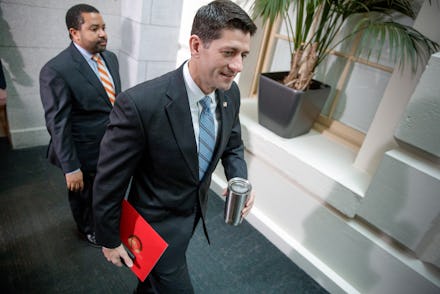What will happen if Republicans fail to pass the American Health Care Act?

After seven years of promising to repeal the Affordable Care Act, Republicans are staring down the possibility they do not have the votes to pass their own replacement plan. A vote is expected Thursday, but by most counts more than 20 GOP conservatives and moderates in the House have said they will not support the American Health Care Act. If 22 Republicans defect, the bill will go down. CBS estimates 24 Republicans currently oppose it. The New York Times counts 47 Republicans concerned or outwardly opposed to the bill, a number that will decrease as final negotiations occur.
It's difficult to overstate the consequences of failing to address health care. While some Americans, especially the 24 million new people who could lose insurance as the years go on, may be pleased to see the bill fail, it would spell political catastrophe for the GOP. Introducing an alternative to the much-maligned "Obamacare" has been a key Republican talking point since 2010. Congress voted dozens of times while Barack Obama was in office to repeal part or all of the ACA. The rallying cry was central to successful Republican efforts to take back Congress and, more recently, the White House. And Trump knows it: He warned the GOP during a Tuesday visit to Capitol Hill that House members could lose their seats if they did not support the bill. "It's a crucial vote for the Republican Party," Trump said Tuesday night.
Failing to pass a conservative alternative to the ACA through the House would make reforms on taxes, trade, deregulation and other marquee Trump issues more daunting. Health care has been the issue that most solidly united Republicans, and failure to address it breaks a core campaign promise for both president and party. Political capital will be squandered; disunity on other issues is sure to come to the fore. And the party's bit-ticket agenda items are likely to suffer.
If House Speaker Paul Ryan does not feel he has the votes, he can reschedule. But pushing back the decision would all but guarantee Congress could not send the bill to Trump by the April 7 recess. The Senate may not act expeditiously on the House legislation, either. Even if the Senate vote comes quickly, the AHCA might fail to draw the required votes in the upper chamber. Consider this Politico headline: "House Obamacare repeal DOA in the Senate."
Republicans' biggest initiative in the Trump era is far from a sure thing. It turns out you can't just will major reforms into existence. Showing everyone that's the case is not a good look for Donald Trump.
This is Mic's daily read on Donald Trump's America. Welcome to the political newsletter that may not have the votes.
Will Republicans get the votes?
• Today: Republicans are having trouble mustering votes for repealing and replacing Obamacare — that's a bad sign for their agenda.
• More: We recap day two of the Neil Gorsuch hearings.
• Even more: Former Trump campaign chair Paul Manafort has more ties to Putin.
• Trump's agenda today: Meeting with the Congressional Black Caucus Executive Committee. Attending a Women in Healthcare panel.
Highlights from day two of the Neil Gorsuch hearings
The Supreme Court nominee continues to cruise toward confirmation. Judge Neil Gorsuch sparred with Sens. Al Franken (D-Minn.) and Sheldon Whitehouse (D-R.I.), but effectively parried their critique of his legal history. The 11-hour hearing featured no fiery moment that could imperil Gorsuch's bid to replace Antonin Scalia on the Supreme Court. Liberal senators might be able prevent a simple majority vote on Gorsuch, but have not indicated they are willing to filibuster Trump's nominee.
Mic has covered Gorsuch hearings, and our latest is at the links below. Day three of Gorsuch's testimony in front of the Senate Judiciary Committee continues Wednesday.
• The 3 biggest takeaways from the Gorsuch hearing.
• If Trump had asked Gorsuch to overturn Roe v. Wade, the judge says he would have "walked out the door."
• Breaking down the moments Whitehouse and Franken got under Gorsuch's skin.
• Gorsuch repeated his assertion that attacks on the independence of judges are "demoralizing." The White House denied it.
Paul Manafort's support for Putin
The former chairman of Trump's presidential campaign worked for a Russian billionaire a decade ago advancing the political interests of Russian President Vladimir Putin, according to a bombshell Associated Press report. Paul Manafort signed a $10 million contract in 2006 to promote the interests of Russia in the U.S. and Europe That work continued through at least 2009. Manafort led Trump's campaign from April to August of last year. During that time, Manafort denied having any contact with Putin or the Russian government.
For more, Mic rounded up all the Russia news from the past day.
News and insight you cannot miss:
• Where does Donald Trump get his personal opinions? Directly from Fox News, it turns out. (Mic)
• The president will head to Brussels in May to meet with heads of state and government from members of NATO, an alliance the president once called "obsolete." (Mic)
• If Republicans get the opportunity to pass tax reform, the party is expected to give major tax cuts to wealthy Americans. (Mic)
• Mexico is urging companies within its borders to not help the U.S. build Trump's border wall. (Mic)
• 60% of Muslims in the U.S. reported religious discrimination last year. (Mic)
• Conservative governors are balking at Trump's proposed budget. (New York Times)